Here are 10 things you should know about Walter Connolly, born 137 years ago today. Though his Hollywood career lasted just 10 years, he left his mark with strong performances in nearly 50 films.
Tag: Western Union
Past Paper: Season’s Greetings—Stop
We don’t view the Cladrite Era as the good ol’ days in the sense that we’re convinced life was better then than now. Different, sure, and it’s those differences that fascinate us. But better? In some ways, yes, but worse in others. We figure things tend to balance out over time. Every era has its highlights and low points.
But we do mourn the passing of certain practices and traditions, and high on that list is the telegram.
Truth be told, we’d give our eye teeth to be able to observe special occasions by sending telegrams. Sure, sure, email’s great, and Facebook, texting and Tweeting all have their place, but none possess the charm or carry the weight of a telegram. And while Christmas cards are a delight to send and receive, imagine sending Christmas telegrams!
We, alas, have never received a telegram, and we’ve sent only one, in 1984 (it never arrived, and to this day, we have no idea whether we were charged for it). But we perk right up any time we see a telegraph office or a telegram delivery depicted in an old movie. The practice and process of sending telegrams continues to fascinate us.
So we were very pleased to come across this promotional pamphlet for Postal Telegraph, Commercial Cables, and All-America Cables (were they all owned by the same concern? We assume so, but we don’t really know. If there are any telegraph experts reading this, by all means, please clue us in).
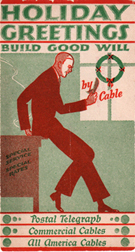 Hi-res view |
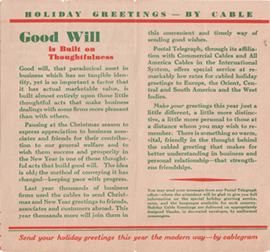 Hi-res view |
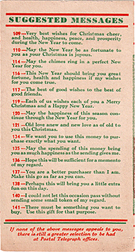 Hi-res view |
We like that telegrams are pitched in the pamphlet’s copy as the “modern way” to send holiday greetings, as the “convenient and timely way of sending good wishes.”
And we love the list of suggested messages on the back. We’d heard that one could order a pre-written telegram by the number, like an item on a menu at a Chinese restaurant, but we’d never seen a list of pre-composed messages and their accompanying numbers. Clearly one would hope to receive a telegram bearing one of the messages numbered from 134-141, since they were all intended to accompanied by wired money. Happy holidays, indeed!
Pitch perfect: public utilities
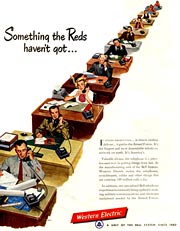 As the Pitch Perfect series continues, today we feature a 1949 collection of advertising slogans used to market public utilities.
As the Pitch Perfect series continues, today we feature a 1949 collection of advertising slogans used to market public utilities.
America, a land of light in a world of darkness (Consumers Public Power).
At your service (New York Edison).
Citizen, wherever we serve, A (Georgia Railway & Power Co.).
Complete gas service for every home (American Gas Machine Co.), Albert Lea, Minn.
Costs less per month of service (Vesta Accumulator Co.).
Don’t write, telegraph (Western Union).
Don’t write, telephone (Bell Telephone).
For the greatest good of the greatest number (City Light).
Friendly place to work, A (Bell Telephone).
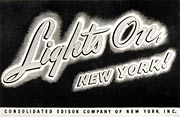 Good job for you, A (U. S. Army).
Good job for you, A (U. S. Army).
In the twinkling of an eye (Trans-Canada System), Telephone.
Live electrically and enjoy the difference (Reddy Kilowatt).
Long distance is the shortest way home (Bell System).
Most for your money in fuel, The (Illinois-Iowa Power Co.).
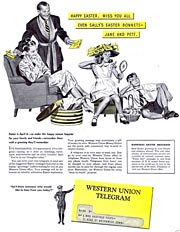 One policy, one system, universal service (American Tel. & Telegraph Co.).
One policy, one system, universal service (American Tel. & Telegraph Co.).
Our ambition: ideal telephone service for Michigan (Mich. Bell Tel. Co.).
Power that lights and moves Alabama, The (Alabama Power Co.).
So many times a telegram means so much (Western Union).
Telephone appointments prevent disappointments.
Use the Bell to sell (Bell Telephone Co.).
Voice with a smile, The (Bell).
Voice with the smile wins, The (Am. Tel. & Tel. Co.).
Voice with the smile wins the world over, The (Am. Tel. & Tel. Co.).
